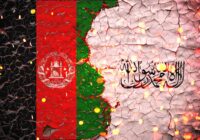The brutal mob attack on a young woman in Kabul reveals the instability of the Afghan government.
On March 19, a 27-year-old Afghan woman named Farkhunda was attacked in the center of Kabul in bright daylight, wrongly accused of burning a copy of the Quran. Kabul police initially tried to protect the woman, but they eventually handed her over to a mob that savagely beat her, killed her and then burned her body.
This is the single most shocking instance of brutality and violence against a woman to occur in Afghanistan since the systematic stoning of women under the Taliban. What makes this event different from the attacks and crimes against women that occurred under the Taliban is that it was committed by seemingly ordinary Afghan men from the relatively progressive capital of Afghanistan.
How, then, do we make sense of this shocking violence?
Back in 2001 when the United States and its NATO allies began their state-building project in Afghanistan, one of the main justifications was the defense of women’s rights. After more than 12 years of military occupation, the US and NATO announced their imminent departure from Afghanistan last year. An analysis of US-led efforts to build a state infrastructure in Afghanistan can help shed light on why the mob turned on one woman walking through a city market.
First, her killing is a failure of the new state to protect one of its citizens. In particular, it demonstrates the weakness of the police and the institutions of justice and law enforcement — main pillars of a modern state.
Second, there seems to have been a failure on the part of US and NATO allies to see the potential contradiction between their nation-building project and their stated goal of defending women’s rights.
What I am referring to here is what Turkish feminist Deniz Kandiyoti has described as a crisis of patriarchy. In Afghanistan, this crisis has reached an acute moment. Patriarchal structures of rule and power have hindered the emergence of a modern state in Afghanistan. Women’s roles in the private and public spheres have been interpreted through traditional, rural and conservative norms that subordinate women to men.
In traditional patriarchal societies, men define their roles as breadwinners who work the land, ply their trade or engage in a skilled craft. However, decades of war and economic disruption have crippled most of the rural economy. This, in turn, has undermined the material foundations of patriarchy in Afghanistan.
It is against the background of patriarchy under pressure that women’s empowerment — seen by the Western occupiers as integral to Afghanistan’s rebuilding — has taken place. It is no surprise that what is, in effect, a shift in women’s social status is seen as a direct threat to the deep-seated, traditional power of men.
The allies’ state-building has increased women’s participation in public life, but it has failed to enact policies to manage the crisis for men.
The country is run primarily by educated, formerly exiled Afghans, who returned from Pakistan, Iran and the West after the expulsion of the Taliban by US forces in 2001-02, and a large number of international aid groups. According to The New York Times, as of December 2014, there were more than 2,300 aid agencies and over 3,000 international aid workers in Afghanistan. Afghan society was modernized overnight with an influx of laptops and smartphones, but there has been little effort to transform gender relations.
The result of all of this is that there is a significantly large group of men who feel excluded from the benefits of the new Afghanistan, as evidenced by my examination of comments by Afghan men on social media over the past decade. These men tend to view women, especially successful and/or independent women in public spaces, as a symbol of men’s collective failure.
This crisis has reached a boiling point: Women increasingly feel threatened by ordinary men in everyday situations. Previously, when patriarchy was powerful, men felt the public space belonged to them. Now they are unemployed and unskilled, but even those who are employed feel their traditional source of power in public and private spheres vis-à-vis women is on a decline. Their anxiety about their status is being expressed violently, especially when men come together as a group, as they did in the case of Farkhunda.
Calls For Justice
Public anger against Farkhunda’s murder has resulted in the arrest of 19 suspects. Afghanistan’s new president, Ashraf Ghani, has denounced her killing as a “heinous crime” and ordered an investigation.
In the meantime, however, conservative voices such as those of Mullah Ayaz Niazi are still trying to defend the old patriarchal system, and are threatening that any significant sentence against the alleged murderers of Farkhunda will result in public outrage by Afghan men across the country.
If the Afghan state is to establish its legitimacy, it will have to deliver justice as a first step. As a second step, however, it must be acknowledged that women’s rights and their physical safety cannot be guaranteed solely by facilitating their ability to take part in public life.
As a long-term strategy, there is a serious need for educational and vocational programs that can integrate those left out of the mainstream. It is also imperative to bring economic development to rural parts of the country and, in the process, redefine the roles of men and women to combat gender-based violence.
The murder of a woman by a group of men has unified public support against the persistence of violence related to patriarchal structures of power in Afghanistan.
In the past week, thousands, including progressive men who are part of an emerging civil society in Afghanistan, have taken to the streets of Kabul demanding justice from the government. Debates and discussions on Afghan television and in the media have highlighted the importance of women’s rights and safety. At the same time, however, it is undeniable that there are conservative social forces (warlords, religious elites and a number of state officials) that are still powerful and not easily defeated by recent public mobilization.
The coming days will be a test of the Ghani government — not just of its commitment to women, but also of its ability to rule.
*[This article was originally published by The Conversation.] ![]()
The views expressed in this article are the author’s own and do not necessarily reflect Fair Observer’s editorial policy.
Photo Credit: Lizette Potgieter / Tracing Tea / Shutterstock.com
 We bring you perspectives from around the world. Help us to inform and educate. Your donation is tax-deductible. Join over 400 people to become a donor or you could choose to be a sponsor.
We bring you perspectives from around the world. Help us to inform and educate. Your donation is tax-deductible. Join over 400 people to become a donor or you could choose to be a sponsor.
Support Fair Observer
We rely on your support for our independence, diversity and quality.
For more than 10 years, Fair Observer has been free, fair and independent. No billionaire owns us, no advertisers control us. We are a reader-supported nonprofit. Unlike many other publications, we keep our content free for readers regardless of where they live or whether they can afford to pay. We have no paywalls and no ads.
In the post-truth era of fake news, echo chambers and filter bubbles, we publish a plurality of perspectives from around the world. Anyone can publish with us, but everyone goes through a rigorous editorial process. So, you get fact-checked, well-reasoned content instead of noise.
We publish 2,500+ voices from 90+ countries. We also conduct education and training programs
on subjects ranging from digital media and journalism to writing and critical thinking. This
doesn’t come cheap. Servers, editors, trainers and web developers cost
money.
Please consider supporting us on a regular basis as a recurring donor or a
sustaining member.
Will you support FO’s journalism?
We rely on your support for our independence, diversity and quality.








Comment